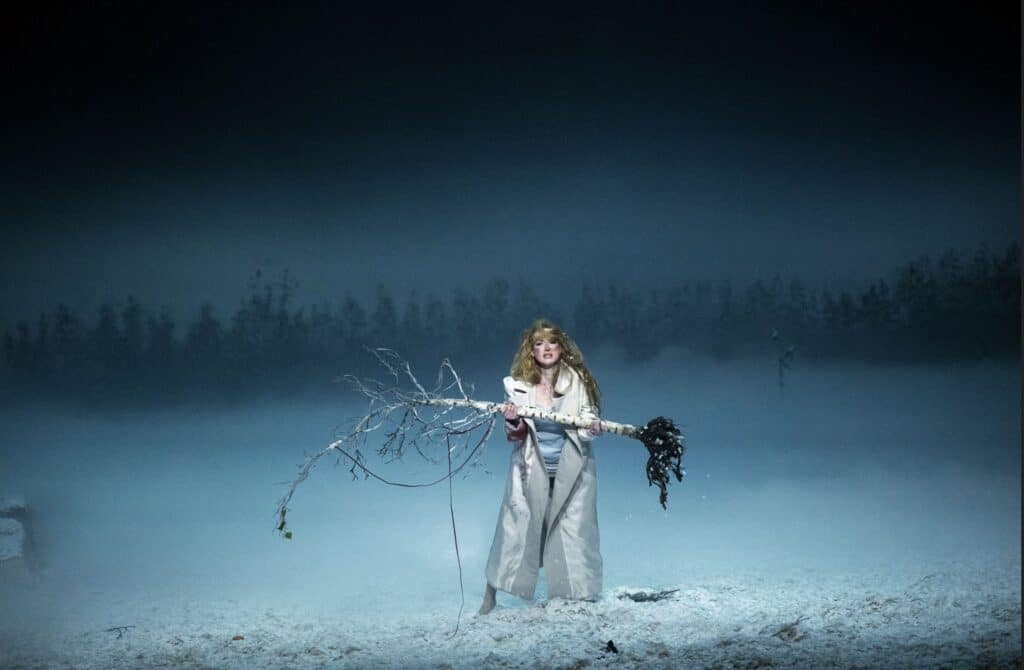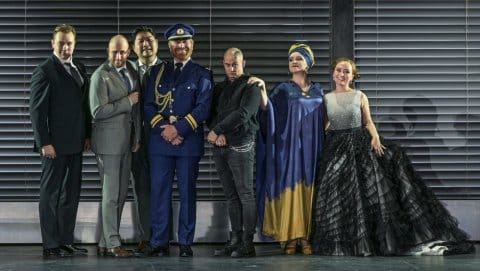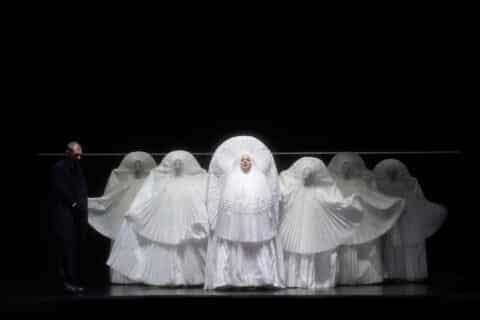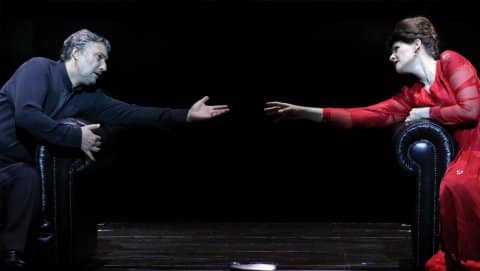DAPHNE • STAATSOPER UNTER DEN LINDEN
★★★★☆☆

Photo Monika Rittershaus
REVIEW DAPHNE: SNOWSTORM AND CASTELLUCCI MYSTICISM UNTER DEN LINDEN
Perhaps the longest and most beautiful snowstorm in opera history falls non-stop for 100 minutes on Italian star director Romeo Castellucci’s radical interpretation of Daphne, a Richard Strauss tour de force of fabulously orchestrated music half-buried in a blizzard I’m still struggling to make sense of.
Strauss wrote Daphne in 1937, placing the opera almost 30 years after the arguably more famous Salome (1903), Elektra (1906) and Der Rosenkavalier (1909).
The music is a completely breathtaking elixir of symphonic timbres in which the fabulous young soprano Vera-Lotte Boecker performs the title role.
Boecker is well worth keeping an eye on. After great success in Vienna and Munich, she has established herself as one of today’s most sought-after sopranos and was named Singer of the Year 2022 by OpernWelt.
I look forward to hearing her again this summer when I review Philip Stölzl’s new production of Weber’s Freischütz on the Bodensee lake stage in Bregenz.
The Berlin audience loudly cheered Boecker at the recitals this evening at the Staatsoper Unter Den Linden, even though this was the eighth Daphne performance since its premiere in 2023 and thus no surprise attack.
And yet it was. In Daphne, Castellucci puts extra turbo on his image as the uncompromising stage director who does not shy away from questionable (over)interpretations of the originals that can give the opera intelligenzia something to talk about. One reviewer wrote, a little offended, that the production has too much mumbo-jumbo and too little drama.
This Daphne is set in a white desert of a barren snowy landscape where it snows all the time, as in all the time.
Singers and choir are dressed in white down coats or militant winter camouflage suits a la Alistair MacLean thriller SOS North Pole (Ice Station Zebra), while Daphne makes an impression by braving the cold wearing big red hair, a sleeveless undershirt, panties and nothing else.
What’s the point?
The show is carried forward by a series of hard-to-decipher Castellucci mysteries, whose indisputable aesthetics and mystery titillate the intellect and provoke thought, but don’t really help the action on stage.
Daphne is a Greek myth about a woman who puts nature above the lustful desires of love. A sympathetic fisherman’s daughter who is harassed first by a shepherd (Leucippus), then by a god (Apollo), and only finally finds happiness and peace by turning into a tree.
The deeper meaning is nebulous and perhaps not the most obvious opera material. Is it a MeToo commentary disguised as a climate fight? A doomsday warning?
Spooky it is, as the chorus uncovers a giant ancient Greek frieze under the snow, suggesting some kind of post-apocalyptic nuclear winter.
– I wanted to illustrate something broken, Castelluci explained when I met the sympathetic director the next day, and got some answers that I still haven’t quite grasped.
Perhaps a clue was given when a gigantic reproduction of the cover of T.S. Elliot’s Wasteland, a collection of poems about a disillusioned, broken, faithless Western civilization, was lowered over the snow-covered stage towards the end.
An impressive finale where the music builds to a formidable crescendo and a wildly engaged audience of connoisseurs let loose with excitement.
Four stars from GOT TO SEE THIS for a challenging opera experience in a magnificent musical setting by the Staatskapelle Berlin, conducted by Frankfurt’s future general music director Thomas Guggeis.




